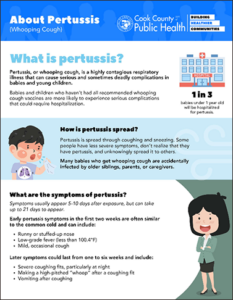
Vaccine Preventable Diseases
Chickenpox (Varicella virus)
Chickenpox is typically mild and self-limiting but may cause very serious complications. Dangerous bacterial infections of the chickenpox skin lesions, along with pneumonia, are the most often causes of hospitalization. Chickenpox can be a very serious disease for young children less than one year of age and adults older than 15 years. Adults account for only five percent of cases but account for approximately 35 percent of deaths.
- Learn more about chickenpox and chickenpox vaccination
- Read the CDC Vaccine Information Statement for chickenpox
Diphtheria
Diptheria is caused by the bacterium, Corynebacterium diphtheriae. Complications include heart abnormalities, paralysis of the eye muscles and limbs, difficulty breathing and ear infections. Death occurs in five to 10 percent of all cases. The death rate of those younger than five years or older than 40 years of age climbs to 20 percent.
- Learn more about diphtheria .
- Learn about diphtheria vaccinations:
- DTAP (Diphtheria, Tetanus, Pertussis): generally given to babies and young children.
- Tdap (Tetanus, Piptheria, Pertussis): generally given to adolescents and adults.
- Read the Vaccine Information Statement for Tdap .
Haemophilus influenzae type b (Hib)
Haemophilus influenzae type b (Hib) bacterial infections were the leading cause of bacterial meningitis in children under five years of age before the introduction of effective vaccines. Throat inflammation (redness and swelling), arthritis (joint swelling) and skin infections are also common complications of Hib infections.
- Learn more about Haemophilus influenzae type b (Hib) and Hib vaccinations .
Hepatitis B
Hepatitis B is a vaccine-preventable liver infection caused by HBV. HBV is transmitted when blood, semen, or another body fluid from a person infected with the virus enters the body of someone who is uninfected. Acute hepatitis B can lead to a lifelong infection known as chronic hepatitis B. Left untreated, chronic hepatitis B can cause serious health problems, including liver damage, cirrhosis, liver cancer, and even death.
- Learn more about hepatitis B and hepatitis B vaccination .
- Read the Vaccine Information Statement for hepatitis B .
Influenza (Flu)
Influenza, commonly called “the flu,” is a highly contagious respiratory illness caused by influenza viruses. The flu may result in mild illness or severe illness accompanied by life-threatening complications.
- Learn more about Influenza and flu vaccination .
- Read the Vaccine Information Statement for influenza .
- Access Cook County Department of Public Health information and resources.
Measles
Approximately 30 percent of reported measles cases result in one or more of the following complications: inner ear infection, pneumonia, brain inflammation, seizures and death. Children younger than five and adults older than 20 years of age are most likely to have complications due to measles infection.
- Learn more about measles and measles vaccination .
- Read the Vaccine Information Statement for measles .
- Access measles fact sheets (English, Spanish, Polish, Arabic, Simplified Chinese).
- Access Cook County Department of Public Health information and resources.
Mumps
Mumps is an infectious disease caused by a virus. The most common symptom of mumps is swelling of the salivary glands close to the jaw. Other symptoms include fever, headache and earache. In rare cases, more serious symptoms can occur, such as meningitis, swelling of the testes or ovaries and inflammation of the joints.
- Learn more about the mumps and mumps vaccination .
- Read the Vaccine Information Statement for MMR (measles/mumps/rubella) vaccinations.
Polio (poliomyelitis)
Polio, or Poliomyelitis, is a virus that can lead to paralysis and death. The last outbreak of polio virus in the United States occurred in 1979. Polio is still common in many places around the world. Due to international travel, polio vaccination remains important.
- Learn more about polio and polio vaccination .
- Read the Vaccine Information Statement for polio vaccinations.
Rubella virus
Rubella virus can lead to arthritis (joint swelling), brain inflammation and internal bleeding. The main objective of rubella vaccination is to prevent rubella syndrome in newborns. In newborns, rubella infection may damage all organs leading to congenital defects (deafness, eye defects, heart defects and nerve abnormality) that may not show up for two to four years. Rubella may also lead to fetal death, spontaneous abortion and premature delivery.
- Learn more about rubella and rubella vaccination .
- Read the Vaccine Information Statements for MMR (or measles/mumps/rubella) vaccinations.
Streptococcus pneumoniae
Streptococcus pneumonia, or pneumococcus, is a common cause of middle ear infections in children. Each year over 20 million visits are paid to pediatric doctors for middle ear infections. Serious diseases caused by pneumococci infections involve the lungs, blood and brain. Two hundred children die each year from pneumococcal disease.
- Learn more about Streptococcus pneumonia .
Tetanus
Tetanus is an acute disease caused by Clostridium tetani. Tetanus commonly causes muscle stiffness, uncontrolled muscle contractions and spasms. Eleven percent of tetanus cases die.
- Learn more about tetanus and tetanus vaccination .
- Read the Vaccine Information Statements for
Whooping Cough/Pertussis
Whooping cough, or pertussis, is a highly contagious bacterial infection. The first symptoms are similar to those of a common cold: a runny nose, sneezing, low-grade fever and a mild, occasional cough. The symptoms may progress to severe coughing fits particularly at night, with “whooping” (primarily in children), and vomiting after coughing.
- Learn more about whooping cough and whooping cough vaccination .

- Read the Vaccine Information Statements for diphtheria/tetanus/pertussis (DTaP ) and tetanus/diphtheria/pertussis (Tdap ) vaccinations.
- Access fact sheets on whooping cough
Updated September 4, 2025, 12:32 PM
